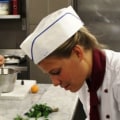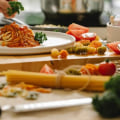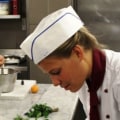You'll first learn how to hold a knife, where to grab it (most beginning cooks grab it too far back on the handle) and where to hold the guide hand. The first lessons are based on product recognition, knife skills and safety. You'll spend more than a few days at the start of your program before using a stove. I definitely came to ICE with the mindset that I already had some cooking skills, but I can say from my own experience that the teaching method at ICE from the beginning was fundamental to the training that took place both inside and outside the classroom.
The culinary school offers hands-on training for all types of aspiring chefs, cooks and food service workers. Whether you want to be the head chef of a high-end restaurant, a personal chef for a private home, or the owner of a catering company, culinary school may be for you. Each culinary educational institution offers different courses and specialties depending on your professional goals and interests. If you are thinking of enrolling in a cooking school, you should know that it will be a challenge, but it will also teach you countless lessons.
I no longer cook professionally, but I use the skills I learned to become a better cook at home today. Below, find 10 valuable lessons I learned in cooking school, take them seriously and use them to boost your own home cooking game. You can also practice starting up by organizing your kitchen. Place frequently used ingredients and tools in areas where they are easy to access (for example, don't put salt on the top shelf of the cabinet).
I store the salt and pepper on a small tray next to the stove and store the cooking oils and vinegars in the cupboard just above it. I group my spices by use, keeping the ones I drink most often on the front and the darker ones on the back. I have a large folder containing all the recipes I cooked at cooking school. It is divided into chapters such as hot snacks, poultry and cakes.
The biggest chapter, by far, is that of eggs. Here you'll find at least 30 different egg recipes, ranging from a classic French omelette to quiche and soufflé. You'll have recipes to work with, but it won't be enough to rely on established cooking times and hoping for the best; you must learn to be intuitive and use all your senses by listening to a sizzle, smelling a scent, watching Maillard's reaction and playing to be ready, savoring and adjusting over and over again, rather than just the instructions and the stopwatch, to determine if something has been done or not. However, culinary school doesn't just focus on preparing flashy dishes or making whole-grain butchers; it starts by learning the basics and it's not long before you're comfortable cooking without a recipe (or, at least, faking it until you make one).
So what do you actually do in cooking school? ICE student Pamela Vachon (Culinary, '1) explains what the lessons are like and some of the skills that will be taught in the kitchen classroom. It's also important to keep in mind that what you learn in cooking school will largely depend on you, as a student. While preparing large batches doesn't create waste, cooking students learn why it's important to cook soups and sauces for several days at a time, along with other recipes that are easily overheated. This is a great way to learn more about the professional standards and practices required in the culinary industry from the experts themselves.
You might think culinary school is about learning to cook, but the first thing you do is work on your knife skills. So, if you've already ventured into cooking or are a novice, studying for a diploma in Culinary Arts can add much more structure to your kitchen and your learning process. I was studying writing wanting to start writing food, so I enrolled in culinary school to learn how to cook first. .


